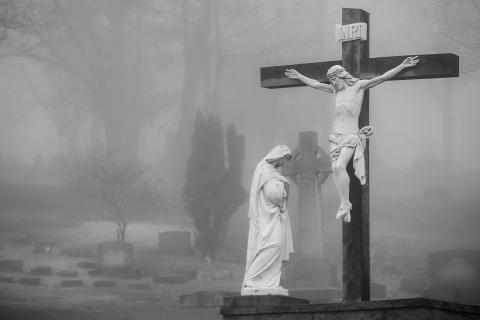
The Latin roots of the word educate offer us a significant glimpse into its true meaning: ex-ducere, or to lead one out. Education is meant to lead individuals out of themselves, teaching them how to manage their passions and desires, live in harmony with others, and devote their lives to something greater than themselves. In this context, it can be said that a Catholic university is “not simply an administrative unit or a center for training, but rather it’s fundamentally a community of believers who share life together and are passing it on to others” (“The Vision of a University”). By participating in such a community, students are guided into understanding the deepest truths of human existence and are prepared to lead fulfilling lives and contribute to the overall good of their communities.
A menu-like approach to education, in which many universities have sought to accommodate themselves to students by allowing students largely to shape their own curricula, stands in tension with the classical vision of education. Rather than inviting young students to submit themselves humbly to the formation of those who have been entrusted to pass down wisdom and knowledge, these young people are left to navigate on their own. While many students leave their universities well-trained for their particular professions, they have been offered an impoverished version of the more substantial educational experiences of the past.
As important as professional preparedness is, the fully educated person possesses something more: namely, the virtues, vision, and insights necessary to navigate life.
Continuing on the topic of education and professional training, Alexander Havard counters the idea that the life of virtue and the life of professional excellence are opposed to one another, explaining instead how the possession of the virtues frees us to engage meaningfully in our careers:
“To have self-mastery is to be capable of directing your emotions rather than becoming a slave to them, investing that power into the realization of your mission in life. To be prudent is to be capable of making the right decisions at the right time. To be just is to be capable of interacting with other people in a powerful way, giving to each person their due. Through justice, you become a friend of humanity and thus a good communicator. To be courageous is to be capable of staying the course, of being audacious and bold, of taking risks. Each virtue is a perfection and power at the same time.”
What of education before the university? M. D. Aeschliman offers a critique of modern elementary school education, discussing the importance of intellectual formation in children through quality literation and historical knowledge.
Oftentimes, the vocation to marriage and parenthood is considered entirely in terms of raising a family. But what happens once that family has grown up and moved out? What does this vocation look like in its “second half”?
Bishop Barron challenges the laity to recognize their important role in promoting priestly vocations. While family members can play an important role in encouraging vocations, so too can non-family members: “Study after study has shown that one of the most important factors in convincing a young man to enter the seminary is that a trusted friend, colleague, or elder told him that he would make a good priest.”
In post-Roe America, many pro-abortion advocates have tried to make the case that legalized abortion protects mothers whose lives are endangered by their pregnancy. This rationale often obscures the real-world and particular context of such rare situations and opportunities for medical treatment. But Jessica Hanna’s story offers a courageous vision of choosing life when your own is at risk.
A new documentary on American Servant of God Sr. Thea Bowman showcases her strong faith and work for justice.
In the world of Christian literature, Mary Cuff reminds us of C. S. Lewis’ epic science fiction trilogy and its lesson that evil sometimes appears under a pleasant guise.
In the world of modern art and entertainment, an in-depth look at legalized sports gambling across the country reveals that our national love affair with it is souring and that it hasn’t produced nearly the revenue it promised. In The New York Times, the ramifications of rapid technological advancement are again explored after a work of art generated by artificial intelligence won a prize at a contest (available here, behind a subscription wall).


